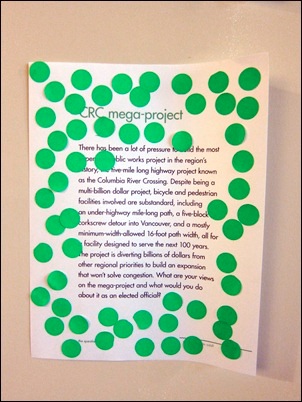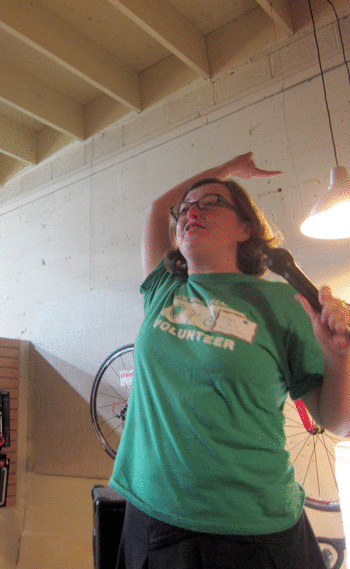
(Photo: Art Almaguer)
This guest post is by Michael Andersen of Portland Afoot, PDX’s 10-minute newsmagazine and wiki for transit commuters.
About 100 Portlanders, nearly all of them under 40, met a who’s who of local politicians in a bike shop on SE Ash Street on Sunday night to rub elbows, talk politics and raise $1,000 to $2,000 more than $3,000 (revised Monday morning estimate!) in political donations.
The cause: Rebooting a political action committee, Bike Walk Vote, that’ll back elected officials who understand and support low-car life. The result: the group raised more in one night than it has in all previous election cycles combined. (Read more about the group’s relaunch here.)
“When I hand someone a flyer that says that ‘Bike Walk Vote endorsed me,’ it says something about me.”
— Jeff Cogen, Multnomah County Chair
By political standards, the haul was still tiny. But politicians present said that in Portland, being perceived as friendly to biking, walking and riding transit is a gift money can’t buy.
“Most people aren’t [politically] active,” said Multnomah County Chair Jeff Cogen, one of 12 candidates Bike Walk Vote successfully endorsed since 2004. “But people in this community share these values. So when I hand someone a flyer that says that ‘Bike Walk Vote endorsed me,’ it says something about me.”

and Multnomah County Chair Jeff
Cogen on stage.
Since 2004, only four of Bike Walk Vote’s 19 endorsed candidates lost. After that election, the PAC slowed down; in 2010, they didn’t endorse candidates at all.
Also present Sunday: mayoral candidates Charlie Hales and Jefferson Smith; Metro council candidate Bob Stacey; Portland city council candidate Steve Novick; and U.S. Rep. Earl Blumenauer.
Blumenauer’s political advice to the crowd, delivered in blue jeans and turtleneck: “Have more parties. You guys know how to have fun.”
You’ll find more info about Bike Walk Vote on our new wiki page about the group, but I’ll leave you with a few more photos.
Bike Walk Vote organizer Peter Welte, left, takes a donation from Metro candidate Bob Stacey, center (the stickers on their foreheads were prizes for folks who donated):

Partygoers enjoyed pizza donated from Hot Lips, other snacks from Crema bakery and Whole Foods, wine from Vino, beer from Coalition Brewing, and bike parking from Shift. The host was Crank, the bike shop at 2725 SE Ash:

Conversation roared on for more than two hours, from 7 to 9:30 p.m.

Southwest Portland pedestrian advocate Roger Averbeck spoke to BWV steering committee member Beth Flanagan beside the Christmas tree:

Evan Manvel, a founder of Bike Walk Vote in 2004 and a returning co-chair, went over the transit cuts, unfunded bike plans and what he described as 164 pedestrians killed on local roads in the last 15 years.

One wall was lined with questions to be asked on BWV’s questionnaire for mayoral candidates. Attendees used stickers to vote on their favorite questions:

And one subject emerged as the clear favorite:

And I thought folks who were there might appreciate this short film about Steph Routh, the remarkable activist who had the task of collecting money from donors. Though most of Portland Afoot’s work is licensed Creative Commons, I’m happy to release this one into the public domain:
(Merry Christmas, Steph.)
Finally, a serious observation…
One more thing.
Of the more than 100 politically involved Portlanders there, about half of whom I’d previously met as a reporter, I saw one person who is primarily a public transit advocate: TriMet lobbyist Aaron Deas.
The event’s organizers gamely included public transit commuters, who outnumber bicycle commuters two to one, in their literature. Manvel went out of his way to mention public transit before he mentioned bicycles.
But in a room that held one politician for every 17 voters, nearly no one whose main interest was mass transportation showed up. Maybe they hadn’t heard. Maybe they didn’t feel welcome; the nearest frequent service line was seven blocks away. As at most bicycling events I attend, just about everyone was white and U.S.-born.
In any case, Portland’s transit riders lack political organization, social capital and, I think, anything approaching Portland cyclists’ will to win. Thanks in part to 20 years of work by bicycle activists, dozens of friendly politicians are yearning to hear from us – eager to get our views on things like transit passes for high schoolers, rail lines to Sherwood and three-hour transfers.
But until we figure out how to speak for ourselves, transit riders will be no politician’s first priority.


